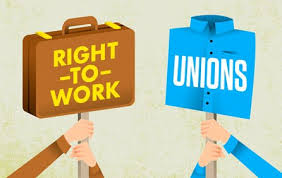
Will fair practice be jeopardized if RI adopts Right to Work?
Right-to-work laws are a deliberate means by which to limit workers’ and employers’ freedom of contract negotiation. Furthermore, and contrary to propaganda, they do not belong in a free society. The enactment of a right-to-work law is an attack against the labor movement and against common sense.
Unions: A collective bargaining agreement is designed and sanctioned as a mutual contract to ensure fair practice from both employers and employees. Part of the union-employer agreement commits the employer to ensure that newly hired workers join the union within a specified period. Right-to-work laws ban these requirements for employees to become dues-paying union members. When a legislature interferes with voluntary employment contracts, it infringes on people’s freedom to bargain with their own labor and possessions. The adoption of right-to-work laws endorses the licensing of arbitrary interventions into the market by politicians.were legislatively enacted by two primary congressional acts. The Wagner Act of 1935, which officially gave workers the right to join a union, and the Taft-Hartley Act of 1947, which outlawed the closed shop as well as the “union shop,” meaning a workplace where the employer could hire anyone it wanted, but you had to join a union after you were hired. These legislative measures were supposed to create a system that was generally inviting to collective bargaining, but did not dictate any of the terms. The concept was that the government would develop and oversee procedures for negotiations, but the details of employment contracts themselves would be negotiated by both parties. Without Taft-Hartley, unions faced the problem of the “free-rider.” Employees could exploit the services and benefits of union membership, including negotiation of wages, workplace health and safety, and representation before management, without paying for it. Taft-Hartley made organizing much more feasible because it eliminated the question of the dues-paying member, “Why should I pay union dues if my fellow workers do not?”
The argument in favor of right-to-work laws is a self-defeating proposition encouraging a race to the lowest common denominator for the majority of workers. If a state doesn’t undercut unions, it will lose jobs to those states that already have right-to-work laws. A parallel theme for states and local governments has been handing out billions in tax breaks to employers looking to expand or relocate, out of fear that if they do not redistribute public money, someone else will, and thus win the jobs. Both are destructive practices and, from a national perspective, detrimental to economic development. With both forms of surreptitious corporate welfare, the only winners are the employers and shareholders. The losers are the vast majority of working class citizens. The workers face lower wages. The local governments lose tax revenue. The communities ultimately encounter a loss in economic stability. However, the small percentage who profit from the lowering of standards for working Americans want nothing more than to weaken the power of labor and their unions by using right-to-work laws.
Corporate-influenced right-to-work laws are a partisan political ploy that torpedoes the basic rights of workers. By demonizing and weakening unions, these laws lower wages and living standards for all workers in the affected state. According to recent statistics provided by the Economic Policy Institute, workers in right-to-work states earn an average of $5,680 less per year than workers in other states. Furthermore, according to US Census Bureau results, household median income in states with these laws is $6,437 less than in other states ($46,402 vs. $52,839) and poverty rates are higher by a difference of 15.3 percent to 13.1 percent overall. And, a surprising and frightening statistic, determined by a national AFL-CIO study, is a worker mortality rate of 36 percent higher in states with right-to-work. Right-to-work for less? Right-to-work to death?
The argument for right-to-work often proposed and endorsed by conservative politicians, wealthy corporations and right-wing organizations (such as the Rhode Island Center for Freedom and Prosperity) is promoting free enterprise and freedom for workers to choose not to join a union and pay union dues. However, supporting a free society means embracing people’s freedom to form unions. And it means acknowledging that unions – and union shop agreements – can offer both unions and employers something valuable. Lest we forget, corporate interests rarely resemble the interests of the majority of working Americans, upon whose back their fortunes are made. Rather, they lobby elected officials to support and enact corporate interests, i.e., right-to-work. Unions, on the other hand, are the lobbyists for the people.